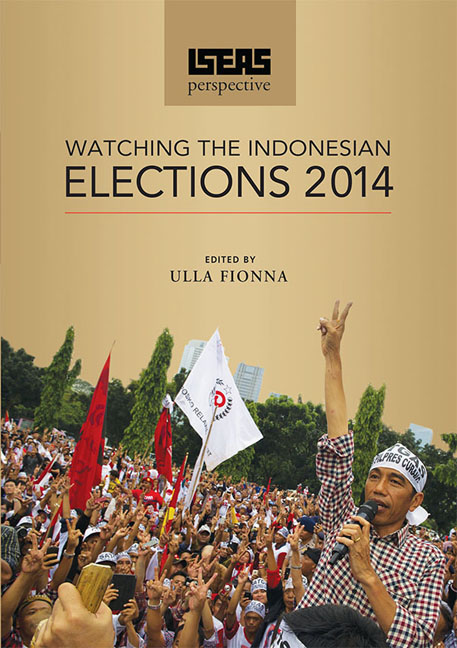Book contents
- Frontmatter
- Contents
- Foreword
- Introduction
- 1 The Gubernatorial Race in Jakarta: Background and Implications
- 2 Indonesian Parties Struggle for Electability
- 3 Who Will Be Indonesian President in 2014?
- 4 Indonesian Presidential Election Forcing Rejuvenation of Parties
- 5 Resisting Democracy: Front Pembela Islam and Indonesia's 2014 Elections
- 6 Getting to Know the Contestants of the 2014 Indonesian Parliamentary Elections
- 7 A Snapshot of the Campaigning in Indonesia's 2014 Legislative Elections
- 8 Unpacking the Results of the 2014 Indonesian Legislative Elections
- 9 Indonesia's 2014 Legislative Elections: The Dilemmas of “Elektabilitas” Politics
- 10 The Islamic Factor in the 2014 Indonesian Elections
- 11 Vote-buying in Indonesia's 2014 Elections: The Other Side of the Coin
- 12 Gap Narrows Between Candidates in Indonesian Presidential Elections
- 13 Analysing the Economic Platforms in the Indonesian Presidential Election
- 14 Indonesian Islamic Parties After the 2014 Elections: Divided and Self-Centred
- 15 Safeguarding Indonesia's Pluralism: An Essential Task for Joko Widodo
- 16 Jokowi's Key Economic Challenge: Improving Fiscal Policy for Equitable Growth
- 17 Crossing the River While Avoiding the Stones: Jokowi's Run-up to the Presidency
- 18 Post-elections Indonesia: Towards a Crisis of Government?
- Epilogue: Jokowi's First Months: Compromise Cabinet, Subsidy Cuts, and Corrupt Coalition
3 - Who Will Be Indonesian President in 2014?
Published online by Cambridge University Press: 29 July 2017
- Frontmatter
- Contents
- Foreword
- Introduction
- 1 The Gubernatorial Race in Jakarta: Background and Implications
- 2 Indonesian Parties Struggle for Electability
- 3 Who Will Be Indonesian President in 2014?
- 4 Indonesian Presidential Election Forcing Rejuvenation of Parties
- 5 Resisting Democracy: Front Pembela Islam and Indonesia's 2014 Elections
- 6 Getting to Know the Contestants of the 2014 Indonesian Parliamentary Elections
- 7 A Snapshot of the Campaigning in Indonesia's 2014 Legislative Elections
- 8 Unpacking the Results of the 2014 Indonesian Legislative Elections
- 9 Indonesia's 2014 Legislative Elections: The Dilemmas of “Elektabilitas” Politics
- 10 The Islamic Factor in the 2014 Indonesian Elections
- 11 Vote-buying in Indonesia's 2014 Elections: The Other Side of the Coin
- 12 Gap Narrows Between Candidates in Indonesian Presidential Elections
- 13 Analysing the Economic Platforms in the Indonesian Presidential Election
- 14 Indonesian Islamic Parties After the 2014 Elections: Divided and Self-Centred
- 15 Safeguarding Indonesia's Pluralism: An Essential Task for Joko Widodo
- 16 Jokowi's Key Economic Challenge: Improving Fiscal Policy for Equitable Growth
- 17 Crossing the River While Avoiding the Stones: Jokowi's Run-up to the Presidency
- 18 Post-elections Indonesia: Towards a Crisis of Government?
- Epilogue: Jokowi's First Months: Compromise Cabinet, Subsidy Cuts, and Corrupt Coalition
Summary
INTRODUCTION
The usual path to become a presidential candidate in Indonesia is to be nominated by a political party or combination of parties that have either won 20 per cent of the national vote in the parliamentary elections or control 25 per cent of the seats in the House of Representatives (DPR). Some parties already have made clear choices: Golkar (Party of Functional Groups) has nominated ex-Suharto loyalist and tycoon Aburizal Bakrie (although former vice-president Yusuf Kalla still lurks in the wings as a possible challenger); Gerindra (Great Indonesia Movement Party) decided on ex-Suharto general and semi-tycoon Prabowo Subianto; Hanura (People's Conscience Party) nominated ex-Suharto general Wiranto; and Nasdem (National Democrat Party) chose ex-Suharto loyalist and tycoon Surya Paloh. The lead party in the ruling coalition, the Democrat Party (PD), has not yet decided on its candidate although it has now moved to bring former General Pramono Edhie Wibowo, into the leadership.
The party that does have a chance of winning 20 per cent of the popular vote is the PDI-P (Indonesian Democratic Party–Struggle), but it has also yet to determine a candidate. In the past, it has nominated Megawati Sukarnoputri. There is also a possibility that the PDI-P could nominate the current governor of Jakarta, the popular Joko Widodo.
However, an analysis of candidate choice must take into consideration the steady alienation of the majority of the population from existing political processes and actors.
“REFORMASI” AND POLITICAL ALIENATION
During the 1990s, peaking in 1997–98, a movement developed demanding reformasi whose main demands were the departure of President Suharto, withdrawal of the army from politics, liberalization of repressive political laws, and the ending of KKN (Corruption, Collusion and Nepotism). The sentiment of this movement reflected a desire for a shift away from an authoritarian system which defended a self-seeking elite to a political system where the rakyat (the common people) would be listened to and its interests promoted over that of the elite. It was a movement strong enough to dislodge an authoritarian leader defended by the military.
- Type
- Chapter
- Information
- ISEAS PerspectiveWatching the Indonesian Elections 2014, pp. 16 - 24Publisher: ISEAS–Yusof Ishak InstitutePrint publication year: 2015



